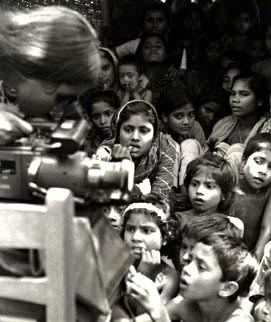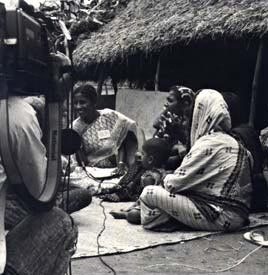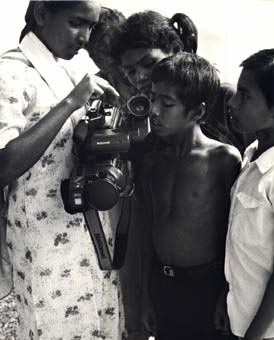Bangladesh - Banchte Shekha
 Bulu, a
field worker with the women's organization Banchte Shekha, wanted to tell a story. Specifically, she
wished to make a videotape about Nasima, a village woman who had been beaten by her husband and chased
from his house. Bulu interviewed Nasima "on location" in her village, rather than in the
privacy of her organization's office, with the intention of generating negative public sentiment against
the abusive husband.
Bulu, a
field worker with the women's organization Banchte Shekha, wanted to tell a story. Specifically, she
wished to make a videotape about Nasima, a village woman who had been beaten by her husband and chased
from his house. Bulu interviewed Nasima "on location" in her village, rather than in the
privacy of her organization's office, with the intention of generating negative public sentiment against
the abusive husband.
The finished video was used strategically. Bulu showed it to the husband's neighbors in order to present Nasima's experience to them, as well as to pressure them not to give false testimony in the village court where Nasima's case would be heard. In most domestic cases, the court in the husband's village has jurisdiction; since women generally marry outside their own villages, they have very little influence in that court, while their husbands' families may have a great deal. The tape about Nasima gave her a stronger voice in a situation in which she would otherwise have had very little power. In addition, the tape is now being used to raise awareness among rural women and Banchte Shekha field workers about violence against women and women's human rights.
Bulu, who years before had been deserted by her own husband, is one of several Banchte Shekha field workers and members who have taken part in participatory video training carried out by Communication for Change. Since the training workshop, Bulu has continued to use video extensively in support of Banchte Shekha's legal aid activities. In her hands, a camcorder is a powerful tool for advocating for women's rights.
Partner Organization Profile
Banchte Shekha is a non-governmental organization in western Bangladesh. With a membership of over 20,000, the organization provides skills training and support to poor rural women, many of whom have experienced domestic violence, desertion, dowry abuse, and rejection by their families. Banchte Shekha's diverse activities - ranging from programs in savings, credit, and income generation to literacy, health, and legal advocacy - reflect the organization's commitment to enabling women to support themselves and live with dignity. As individuals, Banchte Shekha members have learned important new skills; in forming groups, they have learned to save money collectively and use the collateral to take out loans. They have come to understand that, when joined, their voices are heard clearly and carry weight.
Project Implementation
In April 1992, C4C led a participatory video workshop in Jessore, Bangladesh for 16 Banchte Shekha field workers and community members. Among the training participants were ten village women from different educational, social and religious backgrounds. Many of them, however, had shared similar experiences: early marriage, spousal abuse or abandonment - often stemming from dowry issues - and financial hardship for themselves, their parents and their children. These experiences would be reflected in the videos they learned to create.
 Although none of
the participants had previous experience with video, during the three-week training each produced his or
her own program. Each learned to operate the equipment (a Hi-8 camcorder package and playback gear),
conduct interviews, make simple, "in-camera" edited programs, present video playbacks, and
lead discussions about the programs and the community issues they addressed. Perhaps most importantly,
participants learned the importance of teamwork and mutual support in planning, shooting and reviewing
videotapes.
Although none of
the participants had previous experience with video, during the three-week training each produced his or
her own program. Each learned to operate the equipment (a Hi-8 camcorder package and playback gear),
conduct interviews, make simple, "in-camera" edited programs, present video playbacks, and
lead discussions about the programs and the community issues they addressed. Perhaps most importantly,
participants learned the importance of teamwork and mutual support in planning, shooting and reviewing
videotapes.
The three C4C trainers were joined during the first week of the workshop by Neelam Dave and Leelaben Datania from the Self-Employed Women's Association (SEWA) in Ahmedabad, India, another partner organization of C4C. [Learn about Video SEWA] The two guest trainers shared their experiences as grassroots video producers and described the ways in which they incorporate video activities into SEWA's work.
Sharing Strengths
When Neelam Dave and Leelaben Datania from the Self-Employed Women's Association (SEWA) in India came as guest trainers to the Banchte Shekha participatory video workshop in Bangladesh, the benefits were mutual. Leelaben described to workshop participants how she, an illiterate vegetable vendor, had started making tapes and how she gained confidence through practice and experience. The participants, especially those initially intimidated by the technology, said that Leelaben inspired them. For their part, Leelaben and Neelam gained greatly from the opportunity to work in another country and within the context of a different organization. They returned to SEWA with a fresh perspective and new ideas for ways to involve Video SEWA in the organization’s rural activities.
Most of the workshop participants chose to shoot their individuals programs in their own villages, thereby introducing their communities to video and its potential. One participant, Muriam, organized all the women in her somiti (local association) to help with her production on nutrition. The villagers were impressed and suggested other programs she could make.
 In the months
following the workshop, the participants produced diverse programs and discovered important uses of
video within their communities. In particular, video was found to be a powerful tool in support of
Banchte Shekha's legal aid program.
In the months
following the workshop, the participants produced diverse programs and discovered important uses of
video within their communities. In particular, video was found to be a powerful tool in support of
Banchte Shekha's legal aid program.
In one instance, a man became involved with a young woman extramaritally, then disavowed paternity and refused to provide financial support when she gave birth to his child. After Banchte Shekha turned its attention - and its video camera - on the village court proceedings, the man involved reversed his position and promised child support.
This tape, and subsequent Banchte Shekha productions, have helped women learn about alternatives to being abandoned or abused. Through these programs, women can see how their peers have gained justice through village-level mediation and through the courts.
Video has become a powerful and effective tool at Banchte Shekha - sometimes in surprising ways. In one case of desertion, the mere rumor that Banchte Shekha planned to make a tape about the experience of the woman concerned motivated her husband and his family to negotiate a settlement. In many instances, the possibility of exposure or embarrassment on videotape is enough to effect change.
Video as a Bargaining Tool
One Banchte Shekha video team member tells the story of Kukumani, whose husband kicked her out of the house and bribed the village chairman to avoid paying a large settlement. Kukumani and Banchte Shekha members fought together for a fair settlement. Kukumani started working as a teacher and became economically independent. The Banchte Shekha video team decided to shoot a program about Kukumani's experiences, but when her husband heard of their intentions he asked them not to make it. They agreed not to produce the tape only if he signed a legally binding document to pay 101,101 taka (US$ 2,527) if he were to abandon her again.
"Video disturbs the balance of power. I use it as a threat because a man knows I'll be back with my
camcorder if he hurts his wife."
Sahemuda Bulu, Bangladeshi field worker
A second video workshop, offered several months after the initial training, dealt with more advanced production skills. Subsequent C4C follow-up visits showed that the technical quality of video productions had improved; furthermore, team members' ability to conceptualize issues and use video to communicate them had grown. The village women involved in the project, in particular, were more confident and outspoken. C4C's role in the Banchte Shekha project evolved from that of teacher and leader to the more responsive position of advisor and supporter.
Banchte Shekha has carried out exchange activities with C4C's other Bangladesh partner organization, Proshika. [Read more about Proshika and its video activities.] Members of the two organizations' video teams have screened their tapes for one another, shared planning strategies and playback approaches, and even carried out a joint production.
Joining Forces
When members of the Banchte Shekha video team visited Proshika's center in Singair, the group collaborated in documenting a local problem: the destruction of the community forestry projects of many Proshika members. Tree plantations along the roadside were being cut in order to widen the road. Proshika members had tried various tactics both to stop construction and to get compensation, but to no avail. The Banchte Shekha-Proshika team recorded the destruction of the plantations and interviewed people who had lost part of their livelihood as a result. Proshika has since used this jointly produced videotape to gain just compensation from the local government for the lost trees. The experience was satisfying for all of the participants and demonstrated the power of video - and of collaboration - in helping to solve local problems.
The Banchte Shekha participatory video project was funded by the John D. and Catherine T. MacArthur Foundation.
© Communication for Change, Inc. 2003-2019. All rights reserved.
